广州版四年级英语下册全册知识点归纳
广州市广州版四年级英语下册Unit1 四下短语与知识点归纳
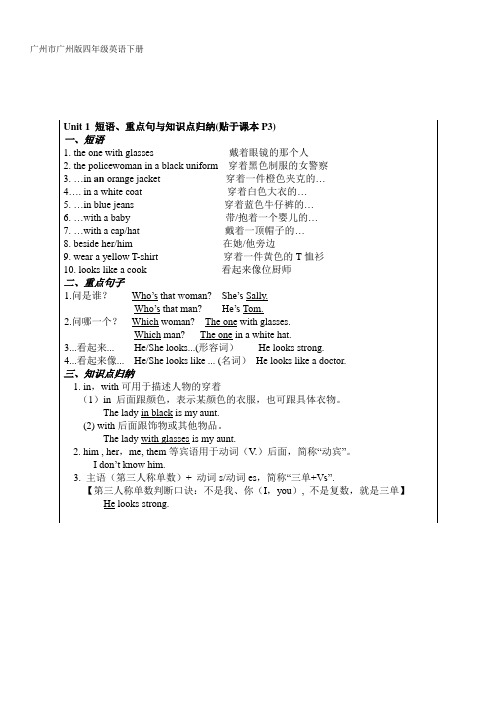
2. him , her,me, them等宾语用于动词(V.)后面,简称“动宾”。
I don’t know him.
3.主语(第三人称单数)+动词s/动词es,简称“三单+Vs”.
【第三人称单数判断口诀:不是我、你(I,you),不是复数,就是三单】
Helooks strong.
广州市广州版四年级英语下册
5.…in blue jeans穿着蓝色牛仔裤的…
6.…witha baby带/抱着一个婴儿的…
7.…with a cap/hat戴着一顶帽子的…
8. beside her/him在她/他旁边
9. wear a yellow T-shirt穿着一件黄色的T恤衫
10.looks likeacook看起来像位厨师
Unit 1短语、重点句与知识点归纳(贴于课本P3)
一、短语
1. theonewith glasses戴着眼镜的那个人
2. thepolicewomanin a black uniform穿着黑色制服的女警察
3.…inanorangejacket穿着一件橙色夹克的…
4….in a white coat穿着白色大hat woman? She’sSally.
Who’sthat man? He’sTom.
2.问哪一个?Whichwoman?The onewith glasses.
Whichman?The onein a white hat.
3...看起来... He/She looks...(形容词)He looks strong.
4...看起来像... He/She looks like ... (名词)He looks like a doctor.
广州四年级英语下册知识点
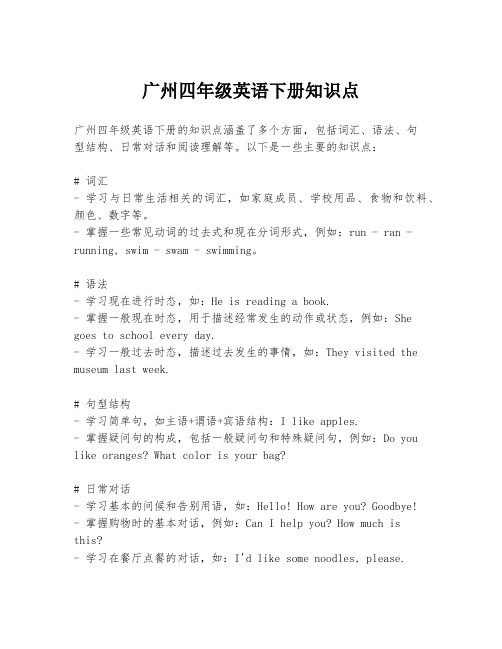
广州四年级英语下册知识点广州四年级英语下册的知识点涵盖了多个方面,包括词汇、语法、句型结构、日常对话和阅读理解等。
以下是一些主要的知识点:# 词汇- 学习与日常生活相关的词汇,如家庭成员、学校用品、食物和饮料、颜色、数字等。
- 掌握一些常见动词的过去式和现在分词形式,例如:run - ran - running, swim - swam - swimming。
# 语法- 学习现在进行时态,如:He is reading a book.- 掌握一般现在时态,用于描述经常发生的动作或状态,例如:She goes to school every day.- 学习一般过去时态,描述过去发生的事情,如:They visited the museum last week.# 句型结构- 学习简单句,如主语+谓语+宾语结构:I like apples.- 掌握疑问句的构成,包括一般疑问句和特殊疑问句,例如:Do you like oranges? What color is your bag?# 日常对话- 学习基本的问候和告别用语,如:Hello! How are you? Goodbye!- 掌握购物时的基本对话,例如:Can I help you? How much isthis?- 学习在餐厅点餐的对话,如:I'd like some noodles, please.# 阅读理解- 阅读简单的英文故事或短文,并回答相关问题。
- 学习如何从文本中找出主要信息和细节。
# 写作- 练习写简单的句子,描述人、事物或事件。
- 学习写日记或简短的信件。
# 听力- 练习听英语歌曲、故事或对话,并理解其大意。
- 学习如何从听力材料中获取信息。
# 口语- 通过角色扮演或小组讨论来提高口语能力。
- 练习自我介绍和描述自己的日常生活。
# 文化知识- 了解一些英语国家的文化习俗,如节日、饮食习惯等。
# 学习策略- 学习如何使用字典查找生词。
广州版四年级英语下册全册知识点归纳
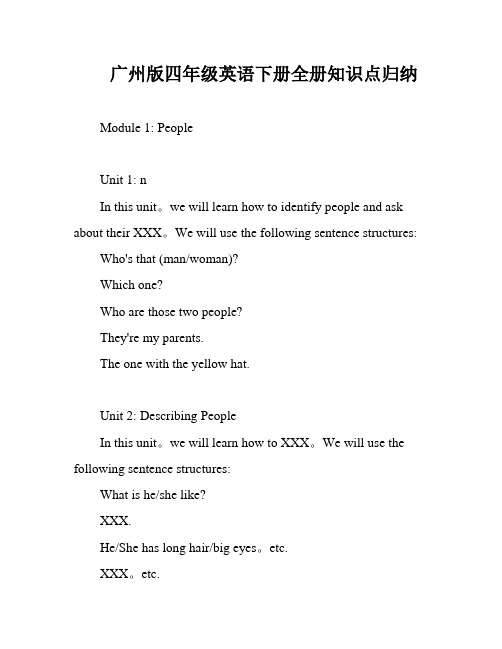
广州版四年级英语下册全册知识点归纳Module 1: PeopleUnit 1: nIn this unit。
we will learn how to identify people and ask about their XXX。
We will use the following sentence structures: Who's that (man/woman)?Which one?Who are those two people?They're my parents.The one with the yellow hat.Unit 2: Describing PeopleIn this unit。
we will learn how to XXX。
We will use the following sentence structures:What is he/she like?XXX.He/She has long hair/big eyes。
etc.XXX。
etc.Key Points:1.We will XXX words containing "c," ".ck," "as(s)," "au/aw," and "air."2.XXX "in" can be used to describe someone's clothing。
while "with" can be used to describe something they have or are carrying.3.We will learn how to use "which" to ask about specific items。
such as pXXX.4.We will review the subjects we have learned。
广州四年级英语下册课文及知识点

广州四年级英语下册课文原文及重要知识点Module 1 PeopleUnit 1 He looks like a cook【课文】Who’s that woman?Which woman?The one with glasses. She has a bag besides her.She’s Miss Liu, our teacher.And that man in a white hat? Can you see him?Yes. But I don’t know him. He looks like a cook.【重点句型】The woman in a black uniform is a policewoman.The man in a blue jacket is a builder.The man in a white coat is a doctor.The man in blue jeans is a farmer.The girl in a white dress is a nurse.【对话操练】Who is the woman in a black uniform?She looks like a policewoman.【人称代词:主格,宾格,形容词性物主代词】Unit 2 She is very kind【课文】The new English teacher is in the teachers’ room. Really? What is she like?She has green eyes and a small mouth.And she is very young and shy.She is very kind.【对话操练】Who is Mr Chen?He is our maths teacher.What is he like?He has round face, big eyes, big nose.And he is happy.Module 2 Daily RoutineUnit 3 It’s time to get up【课文】Mum, what time is it now?It is 7 o’clock. It’s time to get up.It is half past seven now, time to go to school. Ok, Mum.It is a quarter to ten. It is time to sleep.Great. I am so tired.【句型】It is time for sthIt is time to do sth.是……的时候了。
最新广州版英语四年级下册知识点汇总(Unit1-Unit12)
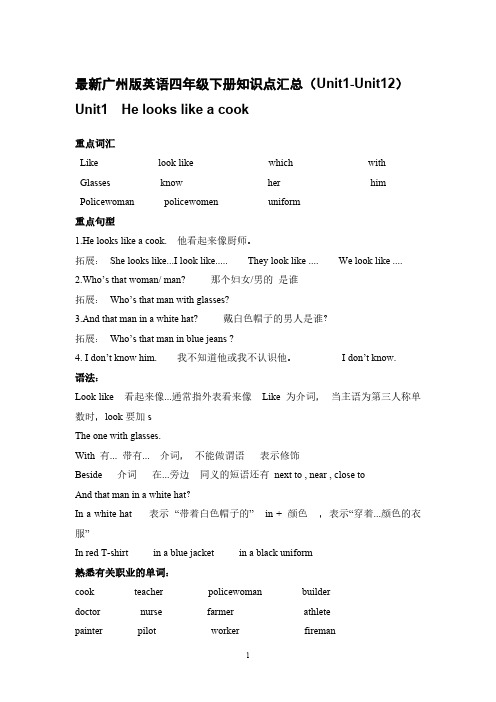
最新广州版英语四年级下册知识点汇总(Unit1-Unit12)Unit1 He looks like a cook重点词汇Like look like which with Glasses know her him Policewoman policewomen uniform重点句型1.He looks like a cook. 他看起来像厨师。
拓展:She looks like...I look like..... They look like .... We look like .... 2.Who’s that woman/ man? 那个妇女/男的是谁拓展:Who’s that man with glasses?3.And that man in a white hat? 戴白色帽子的男人是谁?拓展:Who’s that man in blue jeans ?4. I don’t know him. 我不知道他或我不认识他。
I don’t know.语法:Look like 看起来像...通常指外表看来像Like 为介词,当主语为第三人称单数时,look要加sThe one with glasses.With 有... 带有... 介词,不能做谓语表示修饰Beside 介词在...旁边同义的短语还有next to , near , close toAnd that man in a white hat?In a white hat 表示“带着白色帽子的” in + 颜色,表示“穿着...颜色的衣服”In red T-shirt in a blue jacket in a black uniform熟悉有关职业的单词:cook teacher policewoman builderdoctor nurse farmer athletepainter pilot worker firemanActor actress driver scientist掌握复数形式的名词Glasses 眼镜jeans 牛仔裤shoes 鞋子Trousers 裤子这些词要表示数量时,要加量词,通常用 a pair of glasses / jeans /trousers/shortspolicemen 男警察policewomen 女警察Unit 2 she is very kind重点词汇Kind what is .... Shy round friendly重点句型She is very kind.What is she like?She has green eyes and a small mouth.And she is very young and shy.语法What is she like ? 询问某人的外表怎么样?回答时通常要描述人的外貌特征。
四年级下册广州版英语知识点

四年级下册广州版英语知识点
四年级下册广州版英语教材中包含了许多重要的知识点,让我们一起来了解一下吧!
1. 数字和计数:
在这一学期,四年级学生将学习更大的数字,并学习如何进行计数。
他们将学会念数字,并学习如何用英语来表达不同的数量。
同时,他们还将学习如何用英语来进行简单的加减法。
2. 常见动物和植物:
四年级学生将学习许多常见的动物和植物的英文名称。
他们将学习如何用英语来描述这些动物和植物的外貌和特征,并学习如何用英语来询问关于动物和植物的问题。
3. 问路和交通工具:
四年级学生将学习如何用英语来问路和描述不同的交通工具。
他们将学习如何用英语来指示方向,并学习如何用英语来描述不同的交通工具的用途和特点。
4. 介绍自己和他人:
在这个学期,四年级学生将学习如何用英语来介绍自己和他人。
他们将学习如何用英语来描述自己和他人的外貌和性格,并学习如何用英语来询问他人的个人信息。
5. 时间和日期:
四年级学生将学习如何用英语来表达时间和日期。
他们将学习如何用英语来问询时间和日期,并学习如何用英语来描述不同的时间和日期。
6. 季节和天气:
四年级学生将学习如何用英语来表达不同的季节和天气。
他们将学习如何用英语来描述不同季节的特点和不同天气的情况,并学习如何用英语来询问天气情况。
以上是四年级下册广州版英语教材的一些重要知识点。
通过学习这些知识点,学生将能够更好地理解和运用英语,并提升他们的英语交流能力。
希望这些知识点对学生们的学习有所帮助!。
广州版英语四年级下学期全册知识点归纳

Unit 1: Places- Vocabulary: bank, hospital, library, post office, supermarket- Sentence patterns: Where is the _____? It’s near the_____.- Grammar: Prepositions of place (on, in, near, next to)Unit 2: Activities- Vocabulary: draw, read, swim, write, play- Sentence patterns: What do you want to do? I want to _____.- Grammar: Verbs of activities in the present tenseUnit 3: Healthy Lifestyle- Vocabulary: breakfast, lunch, dinner, fruit, vegetables- Sentence patterns: What do you have for _____? I have_____ for _____.- Grammar: Count and non-count nounsUnit 4: Seasons and Weather- Vocabulary: spring, summer, autumn, winter, sunny, rainy, cloudy, windy- Sentence patterns: What’s the weather like today? It’s_____.- Grammar: Adjectives to describe seasons and weatherUnit 5: Sports- Vocabulary: basketball, football, swimming, running- Sentence patterns: Do you like _____? Yes, I do. / No, I don’t.- Grammar: Verbs to express likes and dislikesUnit 6: Daily Routines- Vocabulary: get up, have breakfast, go to school, have lunch, go home, go to bed- Grammar: Present simple tense for daily routinesUnit 7: Food and Drinks- Vocabulary: noodles, rice, bread, milk, juice- Sentence patterns: What would you like to eat/drink? I would like some _____.- Grammar: Countable and non-countable nouns for food and drinksUnit 8: Clothes- Vocabulary: hat, coat, shirt, dress, trousers- Sentence patterns: What are you wearing? I’m wearing a _____.- Grammar: Articles (a, an, the)Unit 9: My Family- Vocabulary: father, mother, brother, sister, grandparents- Sentence patterns: How many _____ do you have? I have_____.- Grammar: Plural form of nounsUnit 10: My School- Sentence patterns: What’s in the _____? There is a _____.- Grammar: There is / There areUnit 11: My Hobbies- Vocabulary: dancing, singing, painting, playing chess, playing the piano- Sentence patterns: What do you like doing? I like _____.- Grammar: Verbs ending in -ingUnit 12: Animals- Vocabulary: lion, elephant, rabbit, monkey, panda- Sentence patterns: Have you ever seen a _____? Yes, I have. / No, I haven’t.- Grammar: Present perfect tense for experiencesUnit 13: Festivals- Vocabulary: Spring Festival, Lantern Festival, Dragon Boat Festival, Mid-Autumn Festival, Christmas- Sentence patterns: How do you celebrate _____? We _____.- Grammar: Simple past tense for activities in the past- Vocabulary: park, museum, theater, shop, zoo- Sentence patterns: What can you do in the _____? We can_____.- Grammar: Modal verbs (can, could)Unit 15: Transportation- Vocabulary: bus, taxi, subway, train, bike- Sentence patterns: How do you get to _____? I _____.- Grammar: Verbs of transportation (take, ride)以上是广州版英语四年级下学期全册的知识点归纳,包括词汇、句型和语法。
广州版小学英语各年级主要知识点归纳
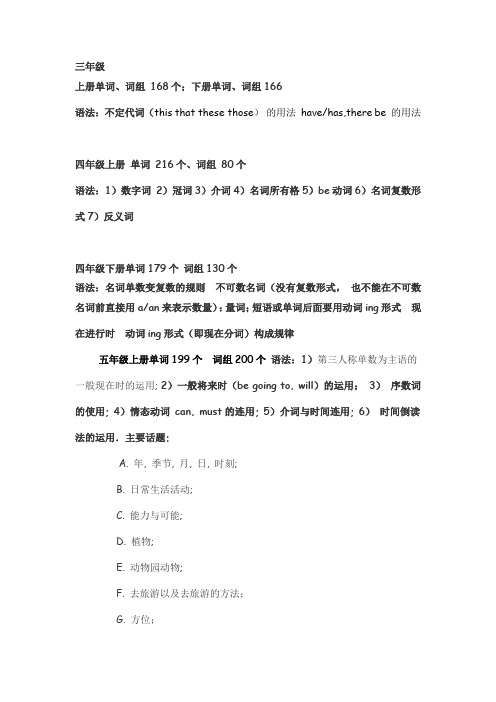
三年级上册单词、词组 168个;下册单词、词组166语法:不定代词(this that these those)的用法have/has,there be 的用法四年级上册单词 216个、词组 80个语法:1)数字词 2)冠词3)介词4)名词所有格5)be动词6)名词复数形式7)反义词四年级下册单词179个词组130个语法:名词单数变复数的规则不可数名词(没有复数形式,也不能在不可数名词前直接用a/an来表示数量):量词;短语或单词后面要用动词ing形式现在进行时动词ing形式(即现在分词)构成规律五年级上册单词199个词组200个语法:1)第三人称单数为主语的一般现在时的运用; 2)一般将来时(be going to, will)的运用; 3)序数词的使用; 4)情态动词 can, must的连用; 5)介词与时间连用; 6)时间倒读法的运用.主要话题:A. 年, 季节, 月, 日, 时刻;B. 日常生活活动;C. 能力与可能;D. 植物;E. 动物园动物;F. 去旅游以及去旅游的方法;G. 方位;H. 问路与应答;I. 规劝与应答五年级下册151个词组125个语法:1)掌握主语为第三人称单数一般现在时的各种句型2)学习和掌握should和shouldn’t的用法3)人称代词和物主代词的用语及正确使用4)形容词、副词的比较级的用法及构成4)I prefer…句型及待客用语的问答5)名词改为形容词的构词方法,如sun— sunny本册书有关于疾病、野生动物、食物等的名词及短语;有关于描述天气特征、人物状态、物体等的形容词还有动词和副词等。
(打电话、看病、询问、量度、用餐、天气)及相关的句型;六年级上册单词107个词组118个六年级下册单词140个词组130个语法:一般过去时;形容词的用法:形容词的比较级变化。
much +比较级;When 引导的时间状语从句--------用when连接前后两个完整的句子;There be句型;宾语从句;时间状语从句;年代的读法;选择疑问句;反意疑问句;连词(and,but,so)的用法;形容物体的形状、颜色、长相等;感叹句的学习;主语+ be 动词+ 形容词;形容词的比较级和最高级;时间表达;情态动词○1can/can’t + 动词原形could/couldn’t + 动词原形○2may/may not + 动词原形○3must/mustn’t + 动词原形(needn’t)Don’t + 动词原形禁止/不允许I hope/wish +句子(can/will/could/动词)我期望……(虚拟)。
- 1、下载文档前请自行甄别文档内容的完整性,平台不提供额外的编辑、内容补充、找答案等附加服务。
- 2、"仅部分预览"的文档,不可在线预览部分如存在完整性等问题,可反馈申请退款(可完整预览的文档不适用该条件!)。
- 3、如文档侵犯您的权益,请联系客服反馈,我们会尽快为您处理(人工客服工作时间:9:00-18:30)。
Module 1 People一、基本目标Unit1*Who’s that (man/ lady)?Which one?Who are those two persons?They’re my parents.The one with a yellow hat.(有*号的是以前学习过的句型,以后同。
)Unit 2What is he/ she like?She is lovely but shy.*He/She has (long hair / big eyes/…).*He/ She is (tall / thin/…).二、重难点分析1、下面是以前学过含有本模块总结的读音规则的词:c: nice, face, mice, science. ck: back, duck, black, sock, clock, jacket, chicken, blackboardas(s): class, glassesau/aw: drawair: hair, chair2、本课的“in”在句子里有“穿着、戴着”的意思,,表示衣着方面的特征;”with”则有“有、带有”的意思,翻译时比较灵活。
例句:The girl in a pink dress in my cousin. 穿着粉红色连衣裙的女孩是我的表姐妹。
The man with glasses is my new English teacher. 戴着眼镜的男人是我的英语老师。
3.Which的用法跟what相似,看下面的例句:Which is your pencil?Which clothes do you like best?4.表示学科的单词我们学过有:Chinese, maths, English, music, art, PE, science。
Show me your books, please.This book is for him.6. 注意art, English, old, eye, ear等词前用an表示一个、只、条、..., 而不用a, 例如:an art teacher, an English teacher, an old man,an eye, an earModule 2 Daily routine一、基本目标Unit 31) What time is it?It’s seven thirty.2) It’s time for breakfast/ to have breakfast/3) It's time to go to sleep4) *Let’s go to school.Unit 41) We get up a t (eight o’clock).2) We have lessons from eight in the morning to four in the afternoon.二、重、难点分析1、下面是以前学过含有本模块总结的读音规则的词:g: good, grape, grow, gardeng: gym, orange, largeea: head, heavyey: they, greyer: mother, teacher, farmer, driver, writer, painter, reporter, sweater, number, mother, father, sister, brother, computer, winner. grandmother, grandfather ear: ear, near ear: bear, pearere: here ere: there, where2、It’s time for 后面跟名词,而It’s time to后面跟动词,如:It’s time for bed/ school/ class/ breakfast/ lunch/ dinner。
It’s time to get up/ go to school/ have breakfast /have lunch /have dinner/ go to bed / ...3、tired不能用作动词,要与be或look(s) 连用,如:I’m very tired. She looks tired.From seven am to eight pm 从早上七点到晚上八点,from one to one hundred 从一到一百6、am(a.m.)表示“上午”, pm(p.m.)表示“下午”。
7、注意时间与介词的连用:at seven (o’clock), at half past fivein the morning, in the afternoon, in the evening, at nightModule 3 Days of the week一、基本目标Unit 51) What day is it today?Is it Monday?It’s Sunday.2) What’s your favourite day?/ Which day do you like best?Unit 61) What do you usually do (after school)?*2) Do you usually/ often/ sometimes (take exercise on Monday)?二、重、难点分析1、下面是以前学过含有本模块总结的读音规则的词:tr: tree, trousers (注意区别于ch和ts的发音)dr: draw, drive, driver, hundred (注意区别于g和j的发音)nk: pink, thank,wr::wrong, write, writeri: hi2、周日的名称可以缩写:Sunday--Sun. Monday--Mon. Tuesday--Tue. Wednesday--Wed.Thursday--Thur. Friday--Fri. Saturday--Sat.3.用favourite可以引出下面的句子:What’s your favourite day/ sport/ colour/ subject/...4、日期与与介词的连用常用on (表示在......日或某天的一部分),如:on Sunday, on Saturday morning, on Wednesday afternoon。
对比:at six o’clock, at half past tenin the morning, in the afternoon, in the evening, at night, at noon5、Like 有两种意思,一是“喜欢”,二是“象”:I like reading. 我喜欢阅读。
I want to be a painter like my father.课本里的句子:I always help me father do housework? 我总是帮助我的妈妈做家务。
Like what? 比如说帮什么?6、英语中表示频度的副词有:always(总是)-usually(通常)-often(经常)-sometimes(有时)-seldom(极少)-never (从不)这些词长放在在行为动词的前面或be动词的后面,如:I always help my parents after school. I am always here on Sunday.有时放在句前或后面,如:I go there very often.Sometimes I go shopping with my parents.7、两个动册间后一个动词通常用不定式to (d0)..., 如:I want to buy a T-shirt. I like to play music. I use this pen to write.但help后一般不加to, 如:I usually help mum do housework.8.He / She likes doing sth. something一般指某种事情He likes to do sth. Something一般指具体的事情9. help sb (to) do sth. 可省toModule 4 Activity一、基本目标Unit 7*1) What do you often do on Sunday/ Saturday// after school; when you have free time)?I often listen to music/ play computer games, have sports/…*2) Do you always watch TV in the evening?Yes, I do. No, I don’t.3)Shall we (watch a cartoon)Unit 81) What are you doing?I’m read ing / playing computer games.2) Are you play ing computer games?Yes, I am./ No, I’m not.二、重、难点分析1、下面是以前学过含有本模块总结的读音规则的词:o: come, does, love, front, Mondayou: house, mouse, mouth, blouse, trousers, playgroundou: young, touchoo: too, pool, schooloo: cook, book, look, goodoy: boy, toyold: oldoor: door, floor2、注意:an interesting book (用an, 不用a);3、one of you 你们中的一个人的意思。
同样可以说:one of them, one of us, one of the pictures, one of the toys,...4、用when引导的句子表示时间,可以有良种写法:1) I often clean my house when I have free time.2) When I have free time, I often clean my house.What are you doing?Where is he read ing?Who is clea ning the house?7、通过比较加深对两种时态的认识:They often play computer games.They are playing computer games.I often help my mother do housework.I am helping my mother do housework.8. an interesting book教如何区分a, an的用法时可以不将规律,用习惯来解释。
